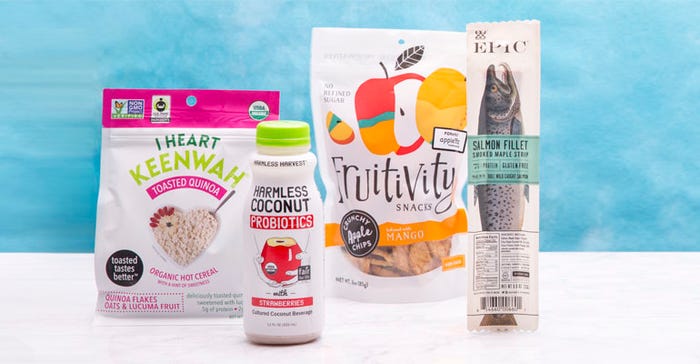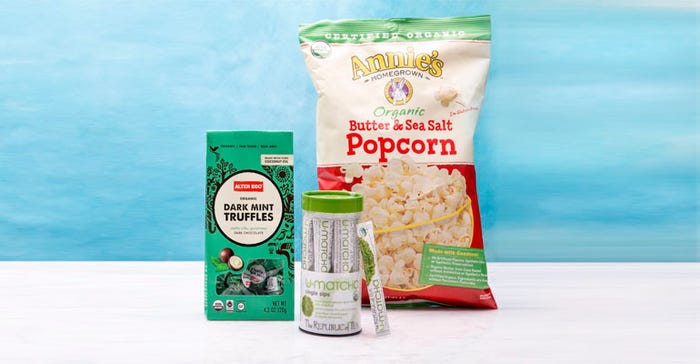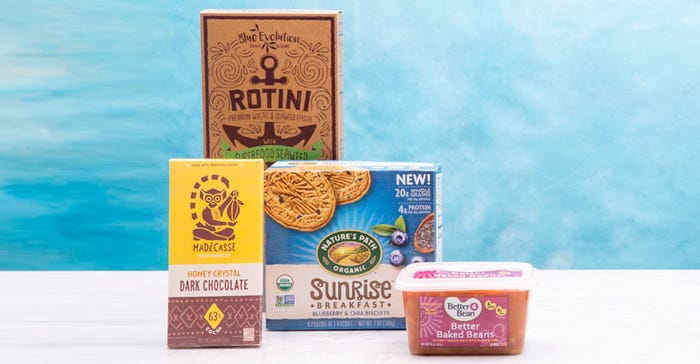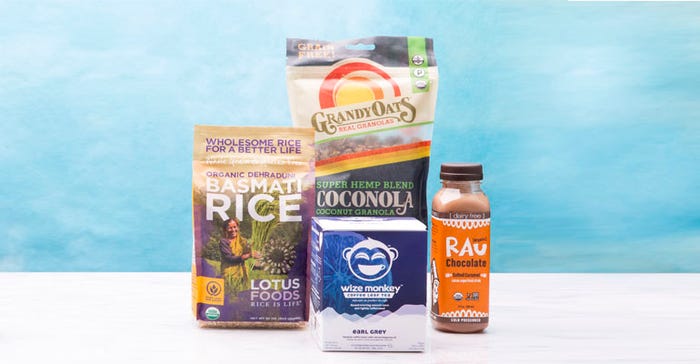
It was the visionary Mahatma Gandhi who said, "You must be the change you wish to see in the world." Such was the driving principle behind Climate Day at Natural Products Expo West, a daylong event designed to illuminate the power natural businesses have to not just mitigate climate change but even reverse it.
The event, spearheaded by the Sustainable Food Trade Association and OSC², a sustainability-focused collaboration of natural industry leaders, was designed to inspire by examining case studies of brands with lofty environmental ideas, and also to provide tangible, down-and-dirty ways companies can make measurable change via their business practices.
One way to coalesce the industry around the monumental task of reversing climate change is through the food system: The launch of the Climate Collaborative, an initiative of manufacturers, retailers, distributors, brokers and suppliers within the natural industry ready to commit to environmental solutions.
"The reason there hasn’t been as much engagement [in climate change mitigation] is because it feels so big and overwhelming," says Nancy Hirshberg, event organizer and chief catalyst at her sustainability consultancy, Hirshberg Strategic. "People don’t see the path forward. Our focus is showing people that solutions are all around us."
Organizers ask that participants commit to one of nine key solution areas: agriculture, energy productivity, food waste, forests, packaging, policy, renewable energy, short lived climate pollutants and transportation. "We can have an impact and meet the expectations of our consumers who care deeply. But we need all the levers working to turn this ship around and address the climate crisis," continues Hirshberg. "I think we can all agree that business is now seen as a more important part of the solution."
Climate Day attendees heard from brands that are unabashed environmental pioneers, such as Patagonia Provisions, Dr. Bronner’s, Organic Valley, Happy Family, Numi, Annie’s and more, and had the opportunity to network with other like-minded participants. The pinnacle was a keynote from renowned environmentalist Paul Hawken, whose current venture Project Drawdown maps 100 real solutions ranging from net-zero buildings to wind turbines as methods that can make cumulative, quantifiable improvements on climate change. The idea: Small, collective actions can change the world.
A tenet of Climate Day revolved around the truism that evolving your company’s environmental policy is good—very good—for business. In a survey of 75 natural companies, Hirshberg and Lara Jackle Dickinson, co-founding director of OSC², found that a whopping 97 percent of companies polled said that global warming was already affecting their businesses—particularly in relation to supply chain issues from extreme weather. Because of California’s horrific drought, for instance, certain crops including almonds, oranges, avocados and sweet cherries experienced reduced yields, making these ingredients more expensive. Supply challenges also occur on a global level as a result of abnormal temperature increases and changes to precipitation—patterns that seem to be on a tangential rise. (NASA recorded 2016 as the hottest year on record.)
Federal policy targeted at climate change mitigation is important, but slow moving. Business, however, is nimble. And consumers are clearly on board with do-good environmental brands that recognize the power of their actions. In a March 2016 report conducted by the Yale Program on Climate Change Communication and the George Mason University Center for Climate Change Communication, 72 percent of Americans believe that corporations and industry should be doing more to address global warming. Companies that ignore our warming earth will lose favor with discerning shoppers.
Climate Day aimed to shine a light on the successes and solutions myriad natural brands—like the ones shown below—are experiencing from an environmental perspective. But the bigger goal, according to Dickinson, is to engage companies in our industry to make a solid commitment. After all, says John Foraker, president of Annie’s in a statement, "The natural products industry has a proud history of leading the way on animal welfare, organic agriculture, fair trade and non-GMOs. Now it’s time to lead on climate."
Food for the earth


I Heart Keenwah Toasted Quinoa Hot Cereal with a hint of sweetness
There are just three ingredients in this hot cereal, but each one imparts specific flavor and story into this new product. Keenwah is committed to using Bolivian Royal Quinoa, an heirloom grain grown consciously and sustainably in Bolivia’s salt flats. Bolivian farmers retain 10 percent of every year’s harvest to replant for the following season and use natural fertilizers such as llama manure to strengthen the soil. Organic, gluten-free oats and Peru-sourced lucuma powder round out this product. SRP: $5.99
Harmless Harvest Coconut Probiotics with Strawberries
Makers of delicious, Fair For Life-certified coconut water have innovated with this coconut milk beverage packed with probiotics. Here, USDA Organic coconut water, coconut meat, cane sugar and strawberries combine into a milky beverage that reminds us of kefir. Harmless Harvest adheres to an ecosystem-based business, which upholds the integrity of its product, and the welfare of people and planet. The company recently reduced its packaging by 24 percent, for example. SRP: $4.99
Fruitivity Mango Apple Chips
Fruitivity is the new incarnation of Appleooz, makers of crunchy, absolutely addictive apple rounds soaked in fruit juice. Based in Boulder, Colorado, the company sponsors the local Community Fruit Rescue, an organization that harvests the tons of produce grown on backyard fruit trees, and donates it to food shares. Nationally, Fruitivity’s parent organization, 1908 Brands, supports environmental organizations through 1% for the Planet. SRP: $5.79
Epic Salmon Fillet
Pioneers in sustainable meat consumption recently launched this 100-calorie snack strip, made with salmon wild caught in the excellently managed Bristol Bay Region of Alaska. Simply seasoned with maple sugar, organic extra virgin coconut oil, sea salt, onion powder, garlic powder and dill. Since its inception, Epic has been a champion of meat consumption as a means to carbon sequestration, particularly as it relates to reviving grasslands via holistic land management. SRP: $1.99

Alter Eco Organic Dark Mint Truffles
If you’re familiar with Alter Eco’s chocolates, you already know these delightful orbs are divine. Picture a soft, minty interior enrobed in USDA Organic, Fair Trade USA cacao, and you’ll get an idea of how lovely these truffles are. Alter Eco is a sustainability superstar. The company founder started PUR Project, now a network of more than 50 organizations, which "insets" carbon by planting native trees (now more than 2 million) near farming communities. Bonus: Alter Eco also pioneered fully compostable truffle wrappers. SRP: $7.99
The Republic of Tea U-Matcha Single Sips
Shoppers can get the healthful benefits of matcha without the traditional bamboo whisk. Each packet of USDA Organic matcha is a 15-calorie delight. It lightly uses organic agave inulin and monk fruit to better appeal to Western palates. The Republic of Tea constantly enacts environmentally friendly business practices, which range from minimalism in packing and shipping materials to embracing conscious certifications including Demeter Certified, Rainforest Alliance Certified and USDA Organic. SRP: $19.99
Annie’s Organic Butter & Sea Salt Popcorn
From a brand dedicated to retooling the traditional snack aisle into one that’s a beacon of sustainable deliciousness, comes this crave-worthy organic popcorn, simply made with fluffy, USDA Organic corn kernels, sunflower oil, butter sourced from a co-op of family dairy farmers, and sea salt. Annie’s also leads in climate change mitigation by reducing packaging impact, and providing $150,000 in sustainable agricultural scholarships to students every year. Talk about investing in the future! SRP: $3.69-3.99

Madecasse Honey Crystal
A 63 percent dark chocolate bar made with USDA Organic heirloom cocoa beans, cane sugar, cocoa butter and one very special ingredient: honey crystals for added crunch. Madecasse represents the intersection of social responsibility and environmental stewardship. The company sources cacao from Madagascar and is committed to making the bar there, too, including roasting, manufacturing and packaging; farmers are encouraged to bolster biodiversity by planting more trees within the cocoa crop. SRP: $3.99
Blue Evolution Rotini
Just two simple ingredients comprise this verdant pasta: Durum wheat grown in Montana and seaweed. Blue Evolution’s entire mission is to get more consumers eating seaweed to pull carbon from the ocean, one of the main components of ocean acidification. As a vertically integrated brand (Blue Evolution grows a lot of the seaweed it uses), the company pledges to have seaweed farms running on 100 percent renewable energy by 2020, and hopes to provide more highly skilled jobs in coastal towns across the United States as it expands. SRP: $4.99
Nature’s Path Organic Sunrise Breakfast Blueberry & Chia Biscuits
For days when even a bowl of cereal seems impossible, these USDA Organic crunchy options make the cut. Each two-biscuit serving delivers 20 grams of whole grains derived from rolled oats, chia seeds and an ancient grain blend that includes KAMUT khorasan wheat, quinoa and amaranth. Nature’s Path is a sustainability leader: In 2014 and 2015, the company diverted 92 percent of manufacturing waste from landfills, purchased renewable energy credits and, to date, donated $3 million to wildlife preservation organizations. SRP: $4.99
Better Bean Co. Better Baked Beans
One way to reduce agricultural emissions? Follow a plant-based diet. The Better Bean Co. makes eating vegan or vegetarian convenient by crafting heat-and-eat beans in tasty blends, such as these molasses and maple syrup-sweetened baked beans. This Oregon-based Certified B Corporation brand helps assuage climate change through a commitment to local sourcing—obtaining as many ingredients as possible from non-GMO farmers in the Northwest—and by making the humble bean as craveable as a steak. SRP: $3.99

Lotus Foods Organic Dehraduni Brown Basmati Rice
Grown with a method of farming called “More Crop Per Drop” (referred to by Oxfam as System of Rice Intensification), this heritage rice allows farmers to increase yields without the need for hybridized seeds, agrochemicals and wasted water. Now available in a 30-ounce bag, Lotus Foods’ sustainable farming practices are up to 65 percent more efficient in reducing methane gas from rice paddies than traditional methods. SRP: $7.49
GrandyOats Super Hemp Blend Coconola
This Maine-based granola company is a trailblazer in sustainable manufacturing, as it has the first net-zero food production facility in the country. How, you ask? The entire facility is powered by 288 solar panels located in a field right next to the building. They offset more than 145,000 pounds of greenhouse gasses each year. The grain-free product is darn delicious, too. Made with USDA Organic ingredients including coconut, pumpkin seeds, hempseeds, maple syrup, almonds, vanilla and more. SRP: $7.99
Wize Monkey Coffee Leaf Tea Earl Grey
This new-to-the-U.S. company recognized a problem exacerbated by climate change and resolved to alleviate it. Warming temperatures in Nicaragua have pushed Arabica coffee cultivation into higher elevations, threatening coffee farmers who rely on the bean harvest for their livelihood. Wize Monkey sources the leaf from biodynamic coffee plants to lengthen the coffee harvest (coffee leaves are harvested nine months out of the year), and make use of an underutilized food. The leaves are processed using hydroelectric power, too. SRP: $12.99
Rau Chocolate Salted Caramel
This delicious, USDA Organic beverage is made without dairy, soy or gluten. Delight in consciously sourced, health-promoting ingredients like cacao powder, coconut palm sugar, cacao butter, Himalayan pink salt, caramel extract and even monk fruit extract that reduces the overall sugar content of this delicious drink. The brand’s mission is to build sustainable supply chains from farm to shelf by educating consumers about the importance of farming and manufacturing transparency. It’s also a luscious afternoon pick-me-up. SRP: $3.99
About the Author
You May Also Like
.png?width=700&auto=webp&quality=80&disable=upscale)





